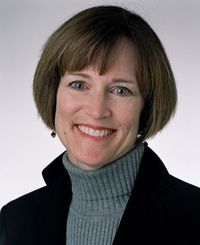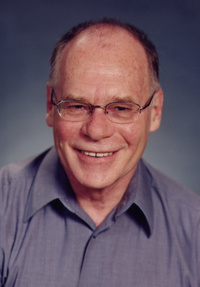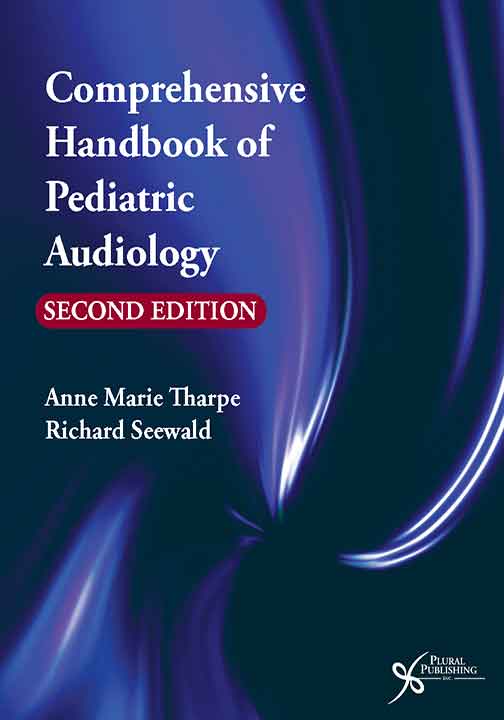
Comprehensive Handbook of Pediatric Audiology
Second Edition
Anne Marie Tharpe, Richard Seewald
Details: 1003 pages, B&W, Hardcover, 8.5" x 11"
ISBN13: 978-1-59756-615-5
© 2017 | Available
For Instructors
Purchase
The Comprehensive Handbook of Pediatric Audiology, Second Edition is the most wide-ranging and complete work of its kind, and has become the definitive reference in the specialty area of pediatric audiology. Content areas range from typical auditory development, to identification and diagnostic processes, to medical and audiologic management of childhood hearing and ear disorders. An interdisciplinary assembly of sixty-six internationally recognized experts from the fields of audiology, speech-language pathology, education, pediatric medicine, otology, and hearing science have contributed to this second edition. Building from the success of the first edition, and aligning with the evolution of the profession, this edition expands and deepens its coverage of early identification of hearing loss, etiology and medical considerations, and hearing technologies, especially implantable devices and the measurement of outcomes resulting from intervention.
New to the Second Edition
- New chapters on the measurement of outcomes resulting from intervention, preventable hearing loss, implementation of newborn hearing screening programs, and the future of implantable devices, among others
- Reorganization for improved sequencing of content area
- Substantially updated chapters
The Comprehensive Handbook of Pediatric Audiology, Second Edition is intended for use in doctoral-level education programs in audiology or hearing science, as well as to serve as an in-depth reference source for practicing audiologists and other professionals, educators, scientists, and policy makers seeking current and definitive information on evidence-based pediatric audiology practice.
From the Foreword
It is exciting to see in one volume comprehensive coverage of contemporary trends in pediatric audiology. No doubt, the information contained within this new edition will be of value to those who seek to better understand the perplexities of childhood deafness and motivate others to search for newer and better ways to serve young children with deafness.
—Fred H. Bess, PhD, Professor and Director, National Center for Childhood Deafness and Family Communication, Department of Hearing and Speech Sciences, Vanderbilt University
Reviews
"Named to Doody's Core Titles in the Health Sciences - Speech, Language & Hearing 2020 list."
—Doody's (May 2020)
"This book would be indispensable as the pediatric textbook in audiology programs or as an invaluable reference for a clinical audiologist or other professionals interested in the latest evidence. It is a wonderful reference for practicing clinicians and others who work with children with hearing impairment as it provides grounds for evidence-based practice."
—Traci Flynn, Karolinska Institutet, in the International Journal of Audiology (June 2016)
"The authors of Comprehensive Handbook of Pediatric Audiology, as stated themselves, have striven to pen an exhaustive and academic textbook on audiology. In my view, it certainly meets their aim of being at a masters or doctoral level. . . . this book does have and exceptionally good international perspective. For example, it goes into minute details on setting up a newborn hearing screening programme which, while less relevant to the typical NHS audiologist, may be essential to clinicians in another country where the NHSP is not established. The book provides some excellent new research, and, therefore, insight in to the routine clinical work we perform, such as with otitis media effusion and dealing with noise exposure concerns in teenagers, which has improved my practice and benefited my patients."
—Lawrence Hill, Audiological Scientist, The Medical Specialist Group Limited, UK, in ENT & Audiology News (September/October 2017)
20Q: Unilateral Hearing Loss in Children - Progress and Opportunities
Read Anne Marie Tharpe's interview with Gus Mueller from AudiologyOnline here.
Foreword by Fred H. Bess, PhD
Acknowledgments
Contributors
Part I. Typical Auditory Development
Chapter 1. Hearing Development: Embryology of the Ear
Mark Hill
Chapter 2. Biologic Development of the Auditory System from Periphery to Cortex
Robert V. Harrison
Chapter 3. Infant Speech Perception
Derek M. Houston
Chapter 4. Auditory Development in Children With Normal Hearing
Lynne A. Werner and Lori J. Leibold
Part II. Etiology and Medical Considerations
Chapter 5. Descriptive Epidemiology of Childhood Hearing Impairment
Adrian Davis and Katrina A.S. Davis
Chapter 6. Genetics of Childhood Hearing Loss
Linda J. Hood and Bronya J.B. Keats
Chapter 7. Medical Considerations for Infants and Young Children With Hearing Loss: A Pediatrician's Perspective
Betty R. Vohr
Chapter 8. Medical Considerations for Infants and Children With Hearing Loss: An Otologist's Perspective
Craig A. Buchman and Oliver F. Adunka
Chapter 9. Current Issues in Preventable Hearing Loss
Andrea Hillock-Dunn and Christopher Spankovich
Part III. Types of Hearing Loss in Children
Chapter 10. Conductive Hearing Loss in Children: Otitis Media With Effusion and Congenital Conditions
Lisa L. Hunter and Daniel I. Choo
Chapter 11. Auditory Neuropathy Spectrum Disorder
Gary Rance and Arnold Starr
Chapter 12. Management of Children With Auditory Neuropathy Spectrum Disorder (ANSD)
Patricia A. Roush
Chapter 13. (Central) Auditory Processing Disorders in Children
Prudence Allen
Chapter 14. Pseudohypacusis: False and Exaggerated Hearing Loss
James E. Peck
Part IV. Early Identification of Hearing Loss
Chapter 15. Principles and Methods of Newborn Hearing Screening
Martyn Hyde
Chapter 16. Newborn Hearing Screening Program Evaluation and Quality
Martyn Hyde
Chapter 17. Screening for Hearing Loss and Middle Ear Disorders: Beyond the Newborn Period
Jackson Roush and Nicole E. Corbin
Chapter 18. Newborn Hearing Screening Program Implementation: Early Hearing Detection and Intervention
Kathryn L. Beauchaine, Jeffrey K. Hoffman, and Diane L. Sabo
Part V. Audiologic Assessment of Children
Chapter 19. Middle Ear Measurement
Lisa L. Hunter and Chelsea M. Blankenship
Chapter 20. Otoacoustic Emissions in Infants and Children: An Updated Approach
Carolina Abdala, Margaret Winter, and Christopher A. Shera
Chapter 21. Threshold Assessment in Infants Using the Frequency-Specific Auditory Brainstem Response and Auditory Steady-State Response
Susan A. Small and David R. Stapells
Chapter 22. Electrophysiological Assessment of Hearing With Auditory Middle Latency and Auditory Late Responses
James W. Hall III and Anuradha R. Bantwal
Chapter 23. Behavioral Audiometry in Infants and Children
Allan O. Diefendorf and Anne Marie Tharpe
Chapter 24. Audiologic Considerations for Children With Complex Developmental Conditions
Allan O. Diefendorf, Kathleen R. Corbin, Rebecca Trepcos-Klingler, and Amanda S. Weinzierl
Part VI. Hearing Technologies
Chapter 25. Current Approaches to the Fitting of Amplification to Infants and Young Children
Marlene P. Bagatto and Susan D. Scollie
Chapter 26. Hearing Instrument Orientation for Children and Their Families
Anne Marie Tharpe, Hollea A.M. Ryan, and Samantha J. Gustafson
Chapter 27. Remote Microphone Systems and Communication Access for Children
Jace Wolfe, Dawna Lewis, and Leisha R. Eiten
Chapter 28. Measuring Outcomes of Infants and Children With Hearing Loss
Teresa Y.C. Ching, Sanna Y.L. Hou, and Vicky W. Zhang
Chapter 29. Cochlear Implants for Children: Promoting Auditory Development With Electrical Pulses
Karen A. Gordon
Chapter 30. Care of Children Who Use Cochlear Implants
Marilyn Neault
Chapter 31. Other Hearing Devices: Bone Conduction
Bill Hodgetts
Chapter 32. The Future of Auditory Implants
René H. Gifford
Part VII. Management of Childhood Hearing Loss
Chapter 33. History of the Management of Hearing Loss in Children
Andrée Durieux-Smith and Elizabeth M. Fitzpatrick
Chapter 34. Facilitating Communication in Infants and Toddlers With Hearing Loss
Melody Harrison
Chapter 35. Potential Meets Reality in Early Intervention for Children With Hearing Loss
Amy McConkey Robbins
Chapter 36. Support for Adolescents With Hearing Loss
Kris English
Chapter 37. Minimal Hearing Loss in Children
Heather Porter, Fred H. Bess, and Anne Marie Tharpe
Chapter 38. Moderate to Profound Sensory/Neural Hearing Loss in Children
Karen C. Johnson, Amy S. Martinez, Laurie S. Eisenberg, and Dianne M. Hammes Ganguly
Chapter 39. School-Age Children
Carolyne Edwards
Chapter 40. Providing Services in Educational Contexts: Defining the Role of the Educational Audiologist
Patricia M. Chute and Mary Ellen Nevins
Index
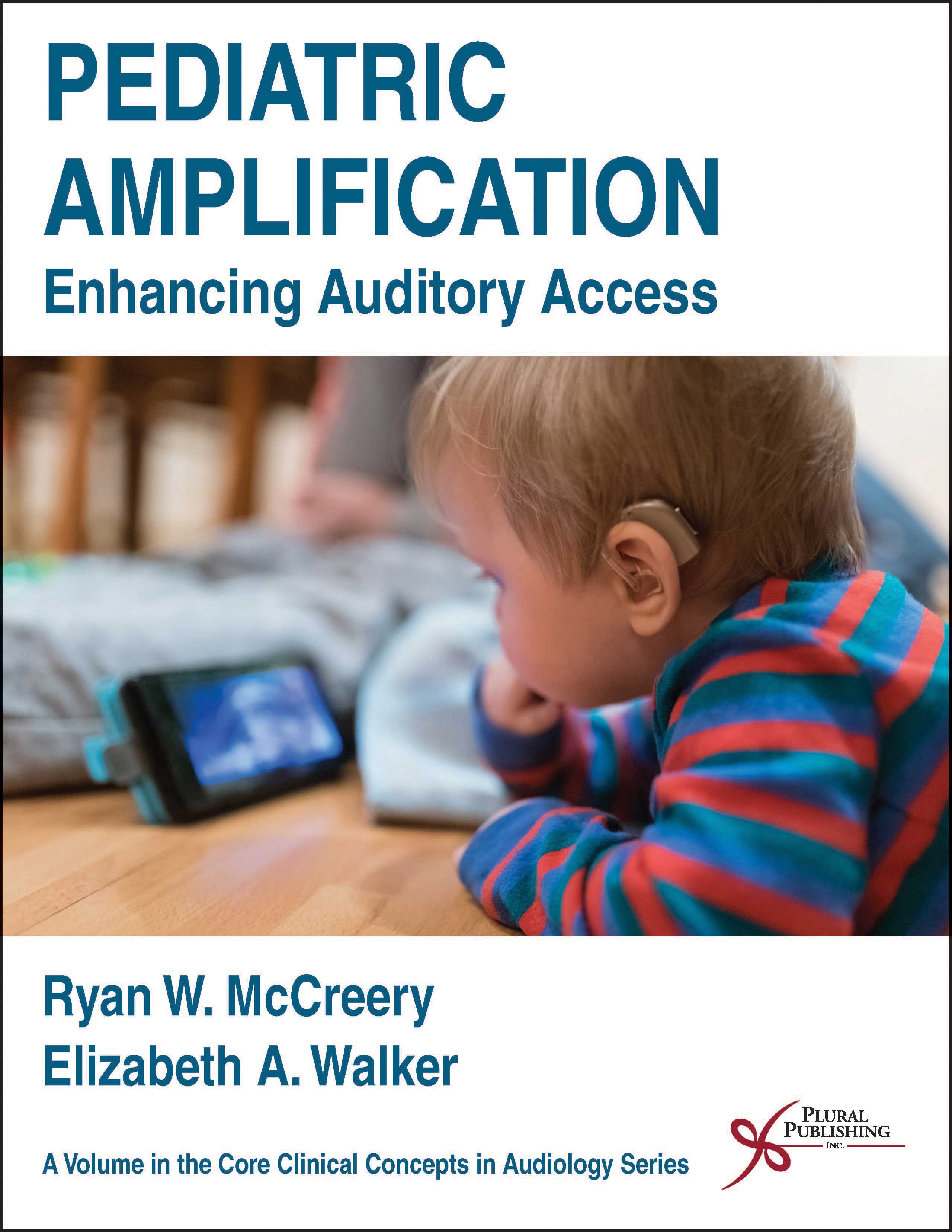
Pediatric Amplification: Enhancing Auditory Access
First Edition
Ryan W. McCreery, Elizabeth A. Walker
Details: 272 pages, B&W, Softcover, 8.5" x 11"
ISBN13: 978-1-59756-992-7
© 2017 | Available
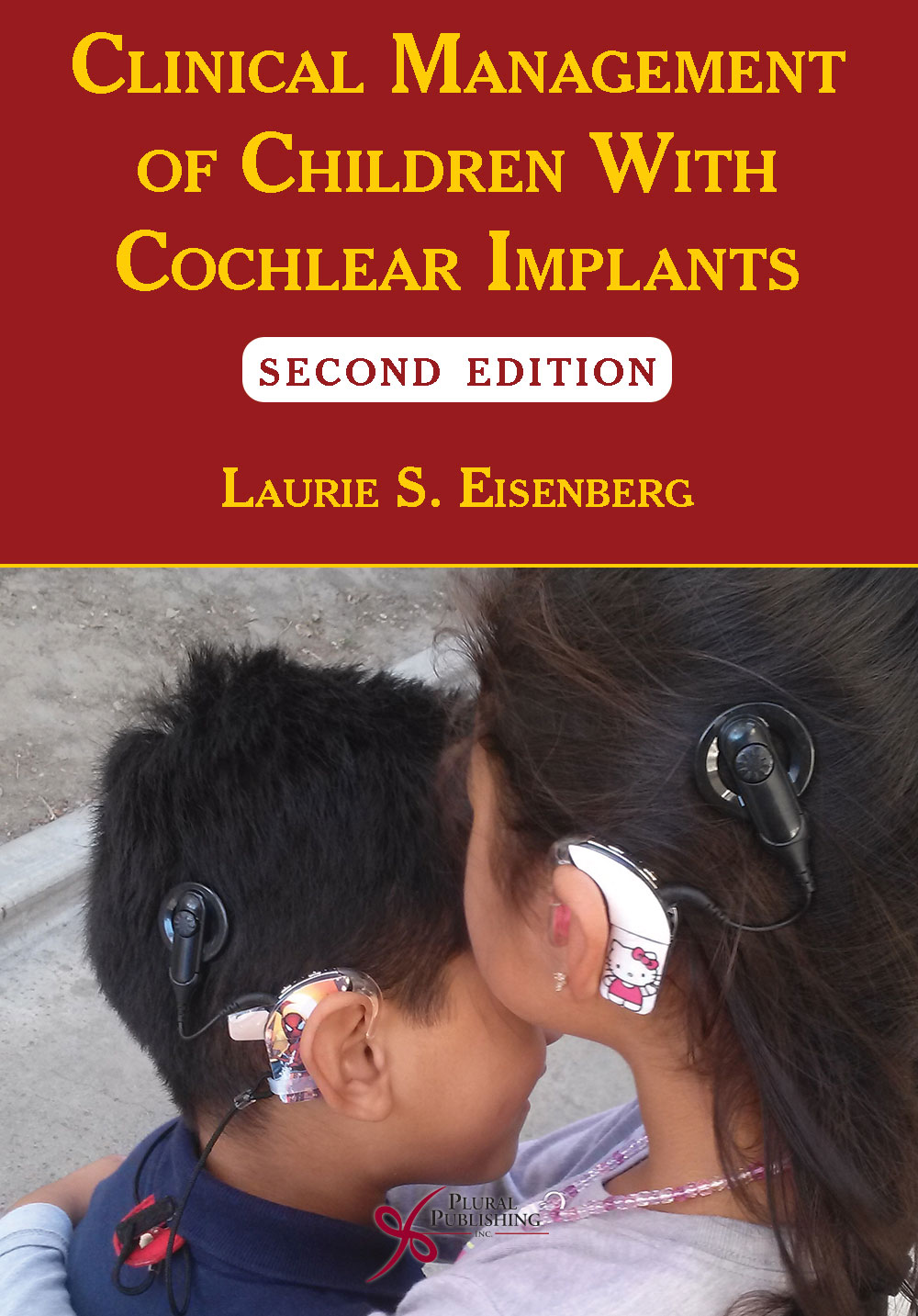
Clinical Management of Children With Cochlear Implants
Second Edition
Laurie S. Eisenberg
Details: 890 pages, B&W, Softcover, 7" x 10"
ISBN13: 978-1-59756-723-7
© 2017 | Available
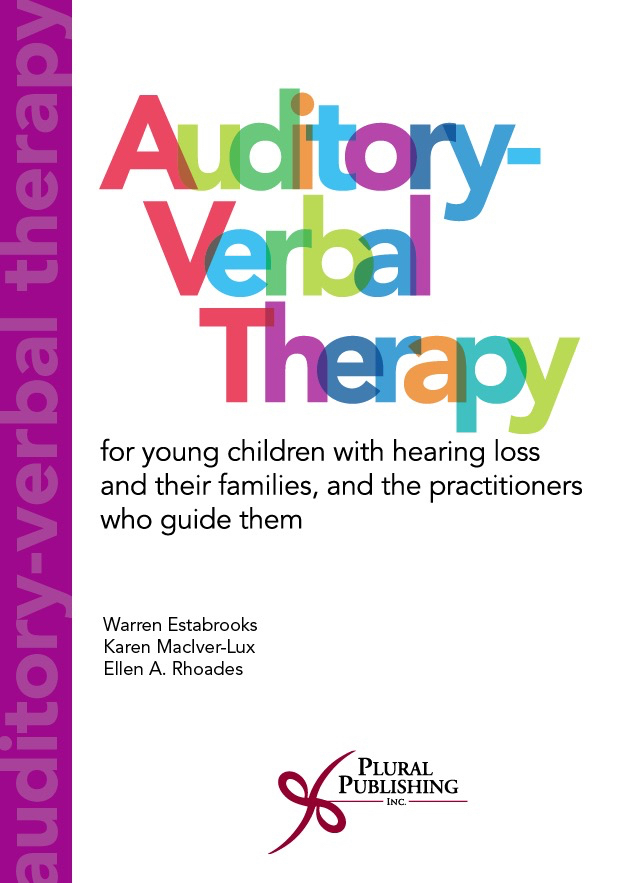
Auditory-Verbal Therapy: For Young Children with Hearing Loss and Their Families, and the Practitioners Who Guide Them
First Edition
Warren Estabrooks, Karen MacIver-Lux, Ellen A. Rhoades
Details: 602 pages, B&W, Hardcover, 7" x 10"
ISBN13: 978-1-59756-888-3
© 2016 | Available
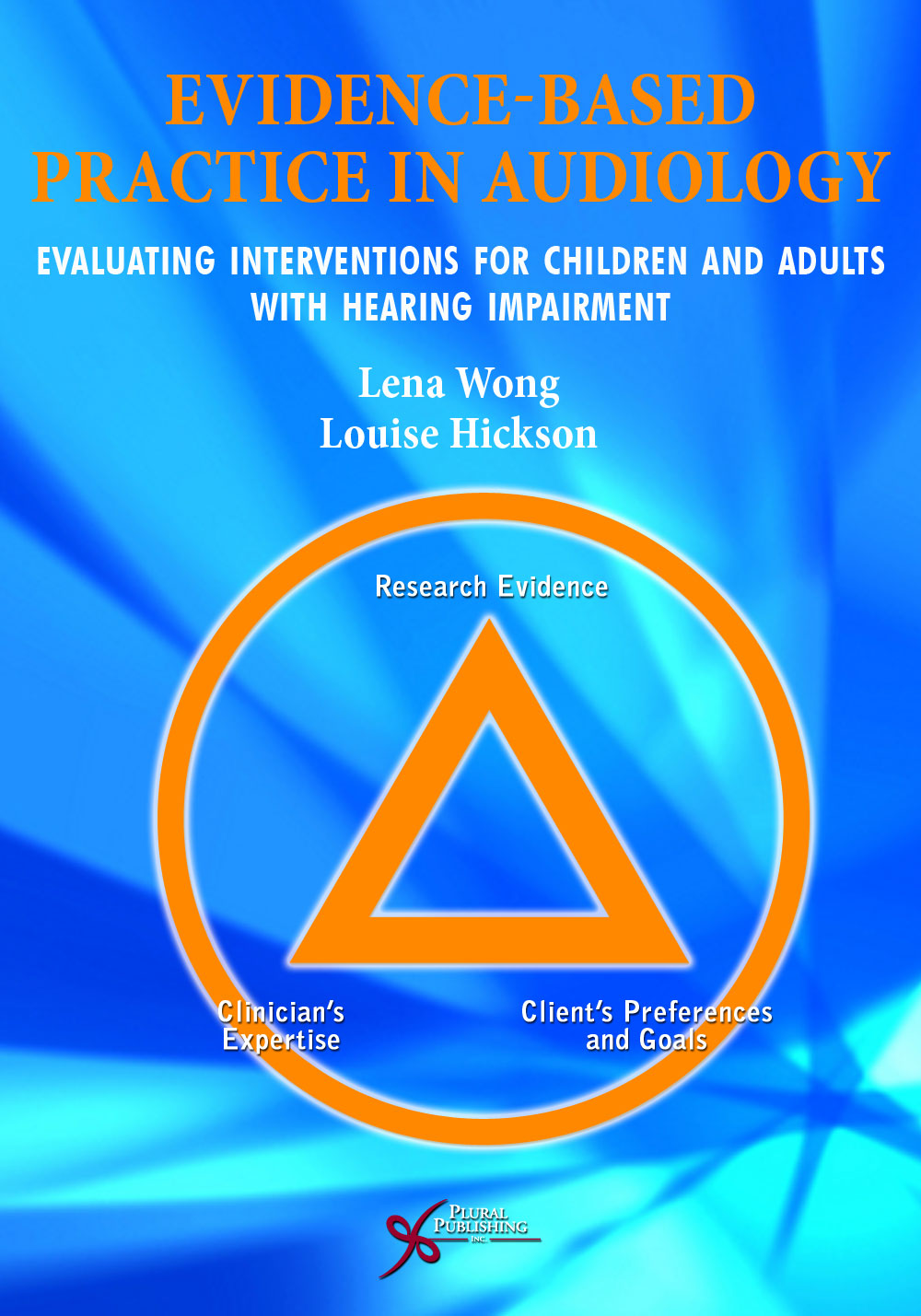
Evidence-Based Practice in Audiology: Evaluating Interventions for Children and Adults with Hearing Impairment
First Edition
Lena Wong, Louise Hickson
Details: 356 pages, B&W, Softcover, 7" x 10"
ISBN13: 978-1-59756-419-9
© 2012 | Available
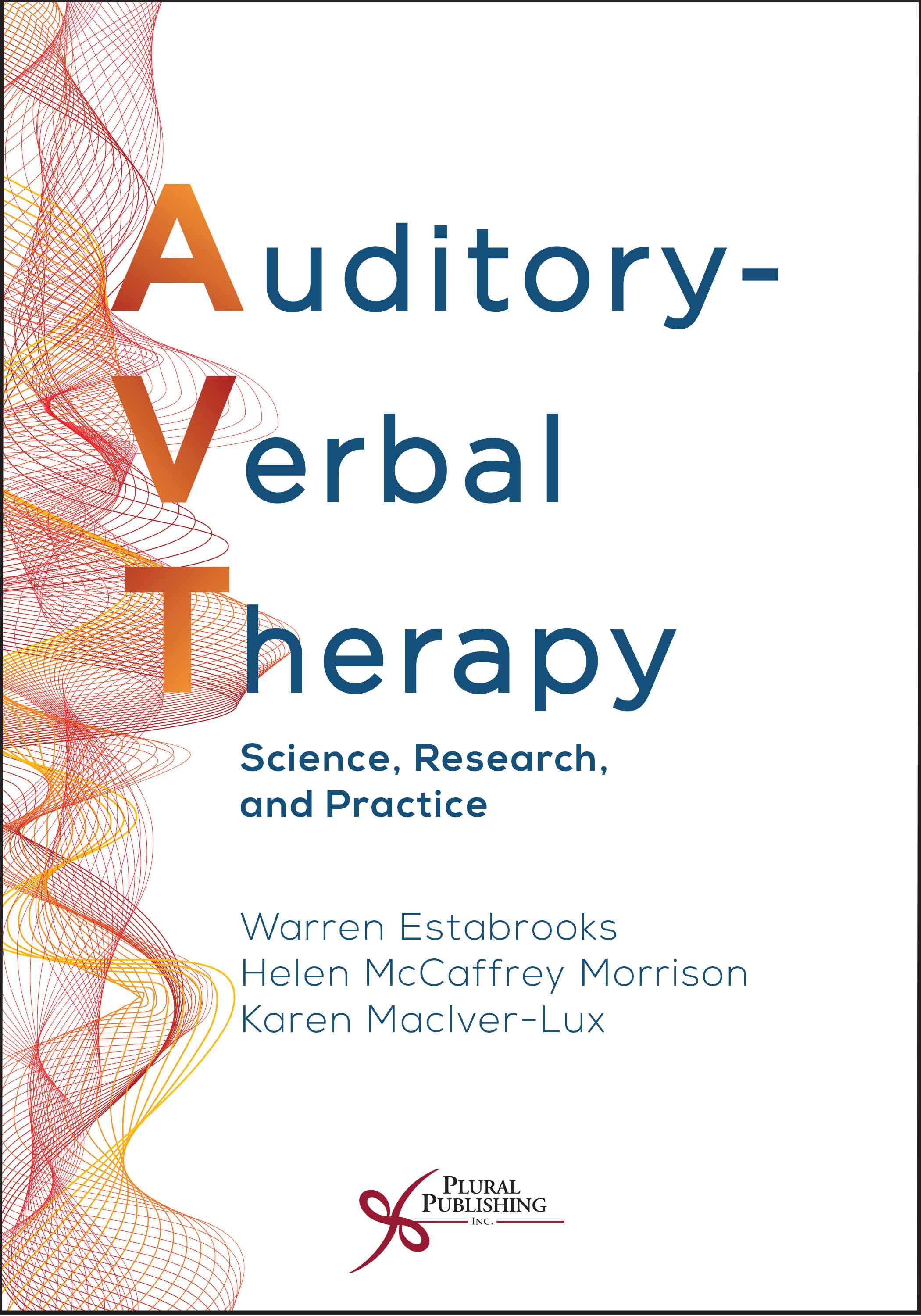
Auditory-Verbal Therapy: Science, Research, and Practice
First Edition
Warren Estabrooks, Helen McCaffrey Morrison, Karen MacIver-Lux
Details: 934 pages, B&W, Hardcover, 7" x 10"
ISBN13: 978-1-63550-174-2
© 2020 | Available
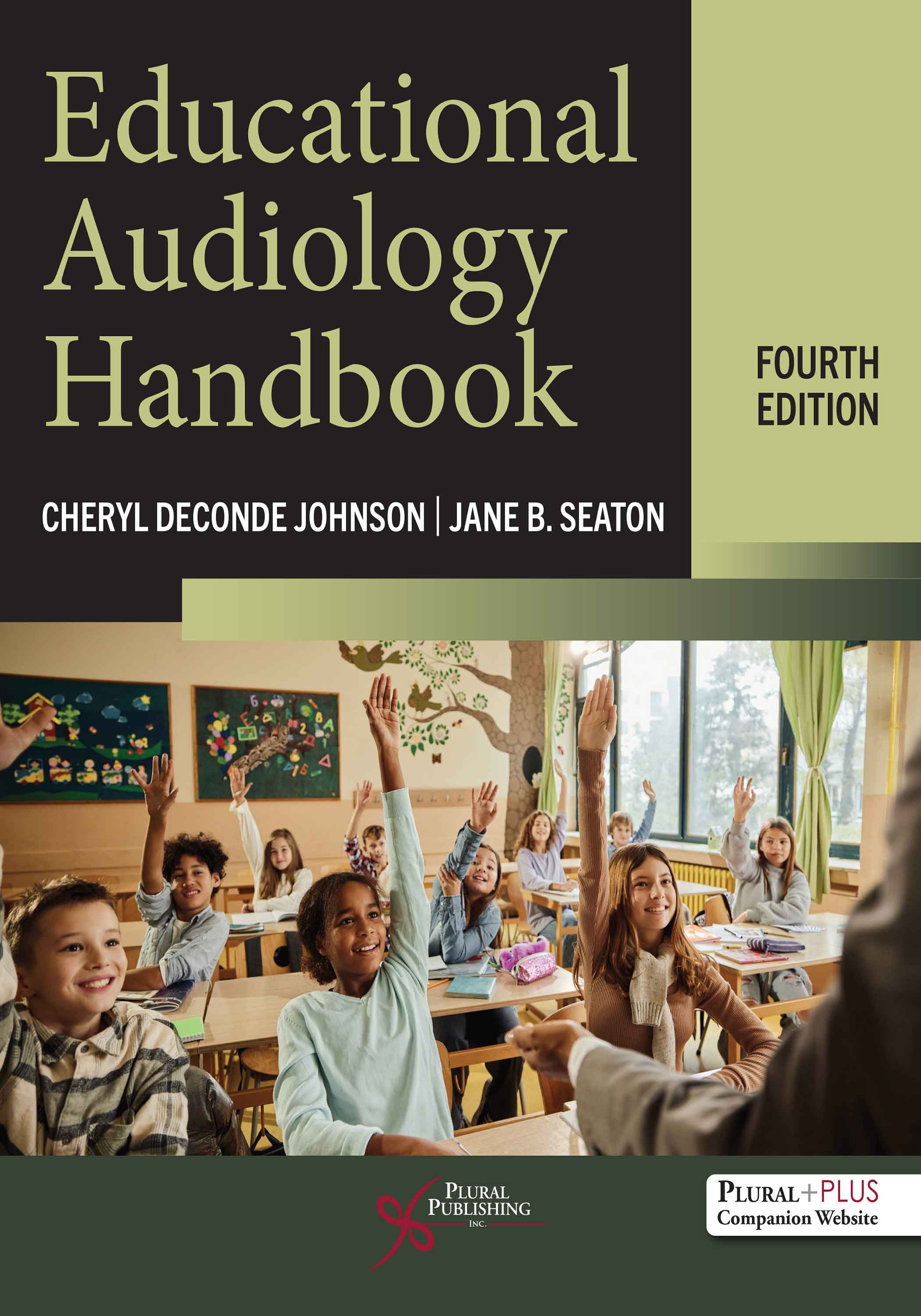
Educational Audiology Handbook
Fourth Edition
Cheryl DeConde Johnson, Jane B. Seaton
Details: 669 pages, B&W, Softcover, 8.5" x 11"
ISBN13: 978-163550-754-6
© 2026 | Available

